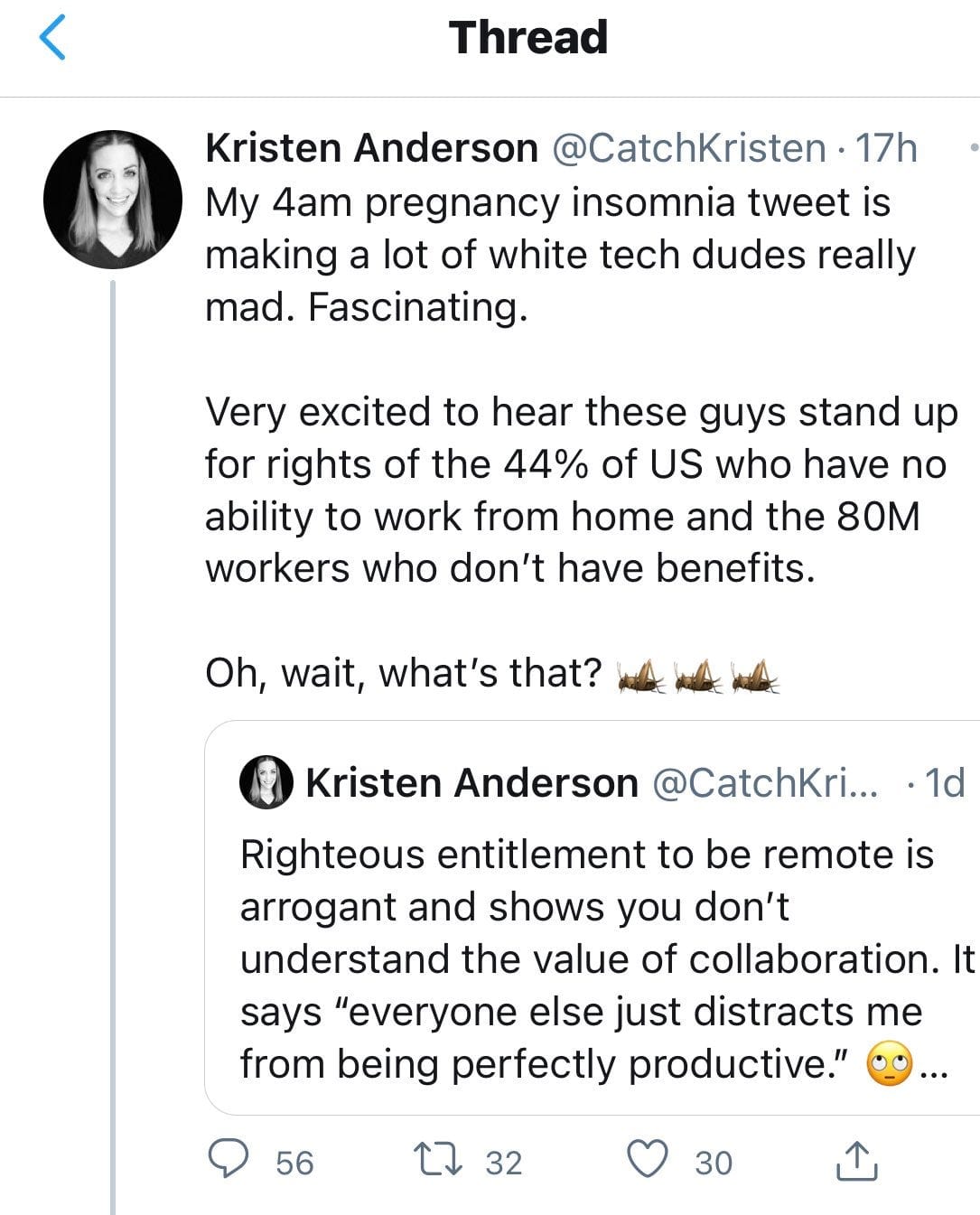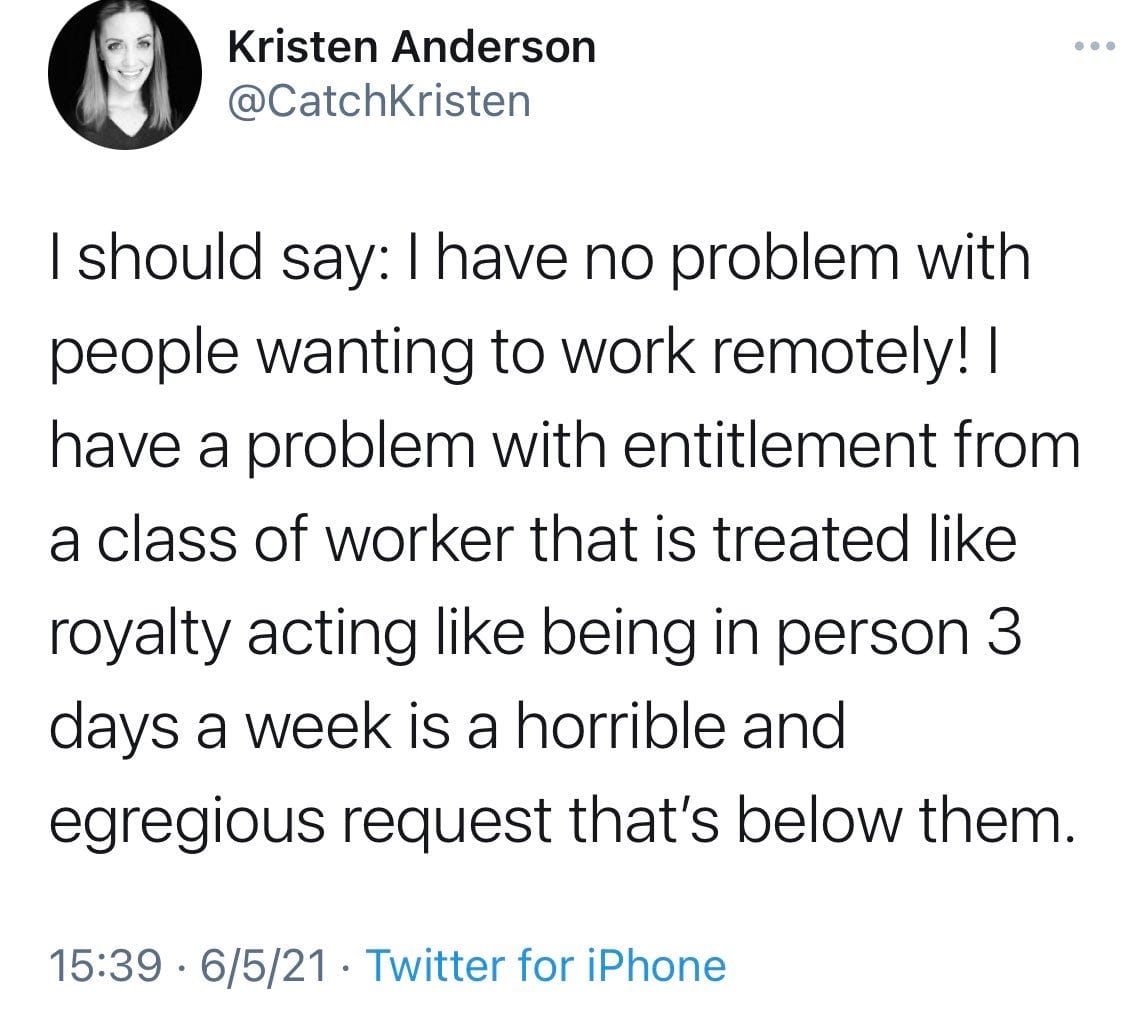This weekend’s new character, if not the main character, was Kristen Anderson, CEO of a startup that claims to “[rebuild] the safety net to serve everyone.” She went on a protracted rant about the “righteous entitlement” of those who don’t want to work in the office anymore, and indeed that you “don’t understand the value of collaboration.”


Her backtracking quickly informed us that, of course, the “white tech dudes” were in her mentions, and they were mad, despite the truth (the tweets are now deleted) that a great deal of people who were not white tech dudes were in her mentions, bringing up everything from the problems of working in an office to the obvious ableism of assuming everyone can work in one.
Reading between the lines, I get the sense that Kristen is having trouble hiring people that are willing to go into the office three days a week, and possibly showing a teensy bit of bigotry by assuming that those who are turning down her generous “you commute two days less” offer are all greedy white tech dudes. But that’s just me assuming.
Anyway, Anderson is not the first, nor will she be remotely the last, person to bemoan the fact that people don’t want to go back to the office, and in my tiny little walnut brain I am imagining that we’re about to see, as vaccinations climb and people return to normal, a culture war between those that believe workers should be in the office and those who believe that there should be a “hybrid approach,” by which they most likely mean you get a few days a week at home. It’ll start by saying “oh just a day or two here and there,” but it’ll grow into either a full of mostly full return to the office.
Why? Because bosses love control, and a lot of people build companies in stupid ways that make them feel better rather than the company better. And believe me, when they say “it’ll only be a few days a week,” they absolutely mean that you’ll return to the office full-time.
The Office Collaboration Lie
I’ve been running my company for years with about four people, and I used to get asked a lot when I’d “scale up” and “hire up.” This was my first taste of how people sometimes build companies based on what they believe is the right thing versus what actually works, and I believe this is going to be the thing that drives the hybrid/return-to-office mantra. Competitors of mine have hired 10 or 20 people with very similar revenues to mine, I imagine because they either want to hand off work to other people while they go play ping-pong or something, or they simply believe that more people is good.
I believe this is the same logic that has poisoned the brains of people that believe that being in the office all the time is a net good. Take a look at this statement from Ms. Anderson:

This is the kind of logic that one can only get by not actually working with your workers, or at least through entering a dreamlike state where you don’t believe people are distracting. The entire “spontaneous collision” theory comes from a place of privilege - of those that do not work on the work product as often as they should - that people overhearing your conversations and interjecting is something that produces positive outcomes versus distractions, and, indeed, that being able to overhear someone else’s conversations is also a good thing. The last time I worked in an office back in 2011 or so (jesus christ!) I remember the distractions genuinely being frustrating - I cannot think of a single scenario where I had something work-related that was improved by someone else hearing my phone call, or my conversation. I doubt things have changed, and this is my newsletter, not yours, so my opinion is good.
A sidenote on class: Kristen makes a point about the 44% of people who can’t work from home, and she’s totally correct there that there is a totally different issue at play - that these people are left behind in a totally remote future. I don’t for a second believe this is her actual concern, based on literally everything else she said - if it was, she wouldn’t be complaining about people’s privilege in wanting to work from home.
That being said, there is definitely another article I’ll write sometime about people who for a multitude of reasons can’t work from home. The reality is that a remote-first workforce is going to be exclusionary for different reasons - those that don’t have a stable internet connection, those who can’t afford their own computer, and so on. There’re also those who have no space at home to separate their work from their personal life, and those with children - an entire article’s worth of things to deal with that I promise I will in the future.
Those who manage but don’t do work love talking about how the office is this magical collaboration circus, where the brilliance of human minds connect like voltron to form Genius. What usually happens is that you can talk to people in person quicker, but oftentimes you’re hearing whatever bullshit someone else is yammering on about. Managers and CEOs like to have people in the office so that they’re able to arbitrarily, using cues unrelated to work, decide who’s a “hard worker” and a “team player,” because that feels more like being a CEO than actually evaluating people’s work, or hiring managers that can do so themselves.
Furthermore, the remote environment has taken away their favorite thing to do - feel like they’re the King or Queen of their office, stomping around and “controlling” things. It’s so much less fun being a hashtag boss when you don’t get to see everybody, and say stuff to them and see them carry it out. I sound as if I’m joking, but I 100% believe that a lot of founders and CEOs operate in this way - and remote work disconnected them from their own ability to lightly bully those they pay.
A McKinsey Global Institute PhD called Susan Lund said the following to Fast Company:
“…you’ll go into [the office] to meet with other people doing brainstorming and innovation, with more collaborative spaces, team rooms and maybe individual phone booths for [private] conversations.”
This dreamlike scenario is what returning to the office is going to be framed as - that you’ll be going back with a point and a reason, but I can guarantee you that nobody really has a point or reason to go back beyond Anderson’s point around theoretical spontaneity, that people’s crosstalk will somehow result in more productivity. Fast Company also quotes “a recent BCG study on remote work [that] stated, “employees satisfied with social connectivity are more likely to maintain or improve productivity on collaborative tasks,” a sentence written by a robot that suggests that is used to suggest that physical space is where these social connections happen, as opposed to the internet, where they also happen.
I am not suggesting that a team never meets and never does anything together, but I think the requirement of X days in the office is ridiculous without an actual impetus to do so. Arbitrarily saying “oh you have to be in three days a week” based on the idea that something might happen is generally something that tell firefighters, because things get put on fire all the time. When it comes to doing coding or writing stuff, what’s the point? Am I waiting around hoping that Steve the CS rep will hear me complaining about something and come up with a magical solution? Or that talking with my friends by the water cooler is going to change my life?
A Friendly Sidebar: I will add that people build their social groups from work, and the social aspect of working makes work easier and your life better. This is an argument that I have yet to see used in favor of work - that this is how people build their friend groups, that these are the “people we see.” But I feel like this is a social structure that is inherently built to promote capitalism - that work provides us with the means to live fiscally and socially, when there are other means of meeting people, which is why you take up hours and hours of your life commuting. This also assumes that talking to people over Slack and Zoom doesn’t create similar social structures and/or lead to people hanging out after work.
There are those who enjoy going to the office, and indeed there are reasons to go to the office, but most of them are really reasons to meet your co-workers in person. These things can be executed by going to a dinner, or a meeting hall, and all talking and having a point of being there - but such things require actual planning and thinking, and don’t make the boss feel like they’re controlling everyone like little puppets.
The Remote Wars
In the same way that you have tech guys that have spent hours of their days arguing that people are babies about COVID, I think that we’re about to face an insufferable culture war around the future of remote work. There is no doubt in my mind that Anderson is a harbinger of a future of bosses that not only claim that you have to be at the office, but that those who are “truly dedicated” will be the ones that do so.
It’ll be the masked-versus-maskless debate of the working world, with decision makers who choose to ignore the wealth of information that remote work is productive and claim that “we need to be back in the offices, it’s part of our company culture.” The amorphous definition of “culture” is going to be what forces people back to the office - that “company culture” is created by people being physically in the same place versus working together.
This all sounds like a conspiracy, but I truly believe, just as we’ve had companies boldly claim they’re “remote forever,” that we’re going to have a few that are “in-person forever.” They will frame those that don’t go to the office as lazy or privileged - that those that care about “getting shit done” are going to be the ones that commute into the office and do the same work they’d do at home in person, and also appear in meetings where everyone is pretending to be taking notes but really looking at Twitter.
There will be those who also only require people to come in a few times a week, like Ms. Anderson, and I believe these folks will also schedule-creep on people in a violent way. The days in the office will have long expected (but not defined) hours, with the excuse of “well, you don’t have to come in tomorrow,” as if it’s a day off versus a day where you’re doing the same thing at home.
Mark my words, the “only a few days” mantra will be something that is used as a control mechanism. The boss will “always be in the office,” and thus the expectation will be you’ll be there too, despite the “only a few days a week” mantra. Those who want to be seen will be seen by going to the office and looking busy, while those that stay at home won’t be considered “team players.” It’ll be like how most offices claim that work ends at 5:30PM or 6PM, but you’ll receive withering gazes and eye-rolls from co-workers and managers.
There will be some asshole who’s entire thing is proudly “forcing” people into the office, and it’ll ironically be some sort of digital-first company. It’s going to be the world’s most insufferable conversation, and it’s going to absorb an entire day on Twitter.
Making Hybrid Work
The “hybrid” work environment is going to be a tough balance to strike as a result. Companies that return to the office and do literally the same thing they were doing before and allow people to work remote are going to create two cultures - the heres and the theres - and will have to find a way to balance that out by fairly evaluating people (EG: having a mixture of managers that are in-person and remote) and making sure that if someone’s in the office, there’s ideally a reason for them to be there.
My worry is that most companies are just going to say “okay you can work remote, or you can come into the office,” and not engage in any introspection or adjustments. If you move your company to a hybrid workforce, there needs to be a concerted effort to not alienate those who are in or out of the office, and create an environment where the physical office is seen as a place to do something specific rather than an area to lurk and socialize. I don’t know how one perfectly executes this, but the answer will come from people that can evaluate work product over how talkative someone is.
The decisions also have to be overwhelmingly informed by workers rather than management. The people who actually put in the hours doing work generally understand the shit that’s going on in the day-to-day that would be disrupted or improved, but company-wide decisions are usually informed by middle-management types that simply present other people’s work, thus they want these people in front of them to point at and harangue.
The ideal hybrid work environment, to me, is difficult to imagine without completely reimagining why we go into the office. If it’s for pragmatic reasons, the visits to the office should be optional and pragmatic - once a month, for a specific reason, for a specific amount of time. If it’s for social reasons…well, maybe socializing is a bad justification for going to work? If a meeting can be done virtually, what reason is there to do it in person, beyond the fact that it feels nice to see people (for some)?
It’s a difficult subject, because there’re some who simply like going to work and being there. There are hundreds of years of people building companies by going to offices, and in about a year many companies managed to adjust well enough to not doing so. I think that the nature of the pandemic meant that people returning to the office now are doing so out of a relief that “it’s over,” without a consideration on the executive level of the lessons learned from letting people work from home. If people are desperate to come back to the office, perhaps the simple lesson is still that they don’t need to be there - but that they can if they want to, and they can work remotely as much as they’d like.
I’m biased in the sense that I have worked remote for around a decade, and my business is one that can be done entirely via email. That being said, I really believe that remote is something that overwhelmingly benefits the worker - it removes the soft wage theft of commuting and worker judgment for leaving on time, it removes geographic restraints, it removes a degree of the physical and aesthetic requirements of the office, and it focuses in on actually doing stuff versus appearing to do stuff.
I also believe that it disempowers pathological management, which is why some companies are so resistant to it. People start businesses for many reasons, but a major one is power - the ability to control and dispatch people at will, which requires to some extent the ability to physically see them. Remote work creates a neutral geography for work - you are not on the boss’ turf, you are not able to be marched into their office, and your co-workers cannot see you get in trouble. Bosses also love having fancy offices to take pictures of and send to their dickhead friends, and they love having them full of worker bees. These aesthetics are depressing, but they are motivators.
And, yeah, it’s going to make hiring more difficult for them too, because you can’t offer fringe benefits like Summer Fridays or Ping Pong or Office Happy Hours. When they want someone in the office three days a week, they’re going to have to answer why, and that answer is going to have to be multitudes more satisfying than “I want to make sure we have spontaneity,” which is definitely how spontaneity works. Remote work inherently messes with the power dynamic of the worker and the boss, and it is going to make many, many brains malfunction.

